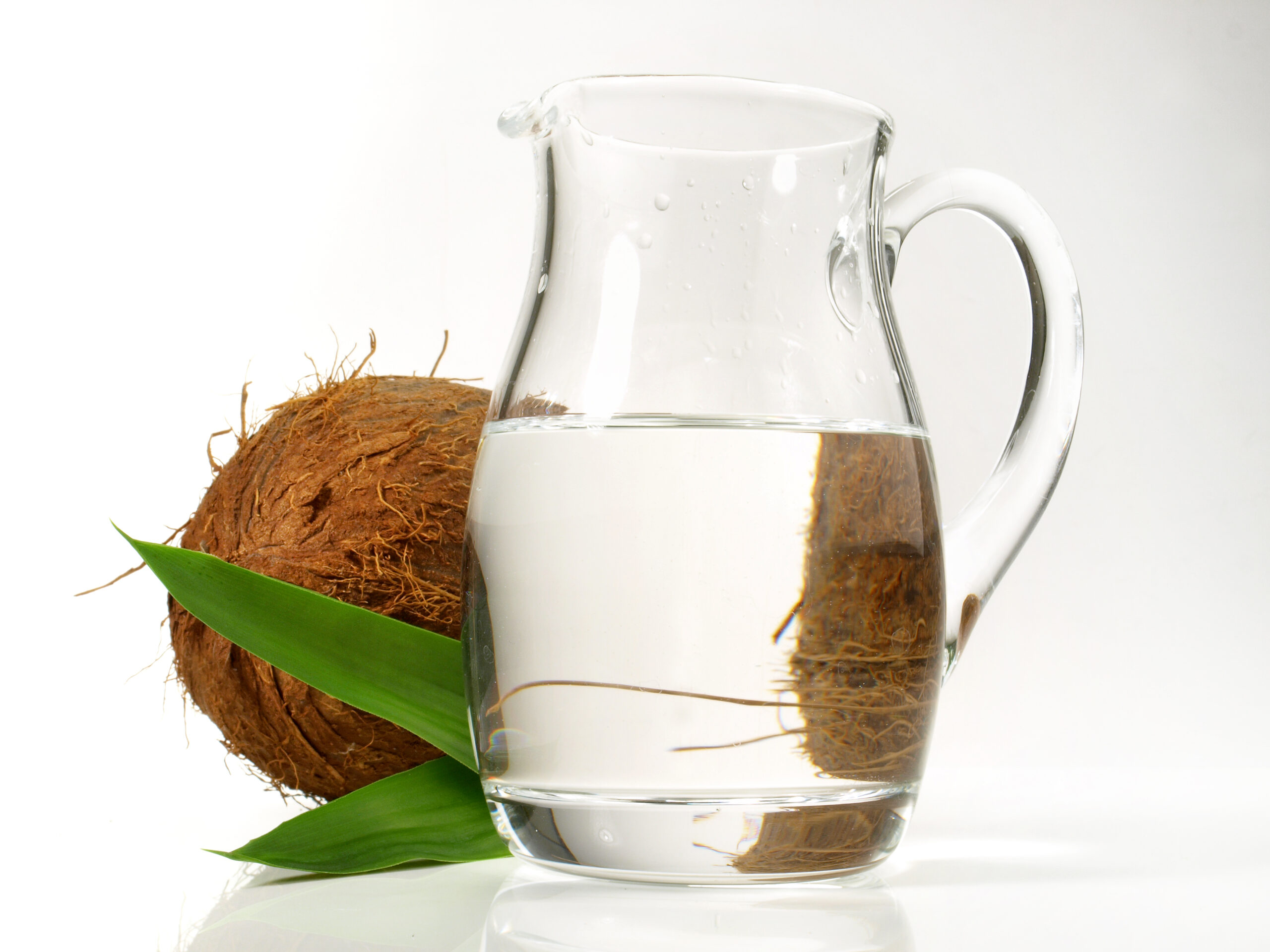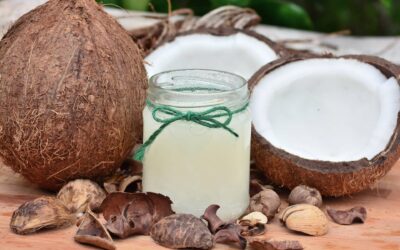The “Cocos Nucifera” which is referred to in some parts of the world as the tree of life and popularly known as the coconut, is well accepted for its outstanding health benefits and embraced by numerous cultures in the pacific region. The coconut is normally a nutritious source of coconut water, juice, milk, cream, and oil.
With the dramatic shift today towards plant-based foods, coconut oil has been able to provide us with outstanding health promises and checked every “box” for the kind of fats health enthusiasts will consider as a “healthy fat.”
Some of the benefits we can experience from the oil extracted from the Cocos nucifera fruit can include a strengthened immune system, fight against heart diseases, prevent dementia and Alzheimer’s disease, helps with belly fat and curbs appetite, just to name a few and 72% of Americans believe on these promises (1).
As many today consider coconut oil as a “superfood”, scientists, and manufacturers have been able to categorize the oil in different forms and not leaving out the added benefits these oils can bring to the table. In the market today, we are able to find virgin coconut oil and extra virgin coconut oil, and also, pulling the market today is coconut-based MCT oil. It is important to note that MCT oil can be originated from coconut, palm kernel, and dietary products like cheese and yogurt (2). Our main focus here will be MCT oil obtained from the coconut plant.
As we stand to get the best healthy products to the world, we have made it our mission to make people understand and learn more about these healthy oils and the benefits they bring. The question which is generally asked today in the coconut oil industry has been MCT and Coconut oil which is better?
What are the Main Difference between MCT Oil and Coconut Oil?
In order, for us to fairly distinguish between MCT Oil and Coconut oil, we must be able to understand their originality, how they are obtained, their uses, and their unique benefits. From this light, one can be able to understand the differences and similarities of both oils from their features and characteristics which will, in turn, shed light on any priority according to the end-user and the purpose for which we sort these oils.
Meanwhile, their features may stand apart, their compounds may present unique benefits in different ways as both oils are still widely considered as healthy fats. It will all greatly depend on what we are looking to achieve from these oils at the end of the day.
What are MCTs
MCT simply means medium-chain triglycerides and the term triglycerides is just a technical term for “fat” with the purpose of either being stored as body fat or used up as energy when consumed. These fats are considered healthy fats and are highly popular in keto or ketogenic diets.
Unlike MCTs, there is also the existence of LCTs (long-chain triglycerides) which are also fatty acids found in plant or animal-based foods and over 98% of all the fatty acids we consume are LCTs (3).
The main difference between LCTs and MCTs can be seen in their structure, being MCTs are mostly made up of 6-12 carbon atoms (4) whereas LCTs can contain more than 12 carbon atoms (5). Also, a difference can be seen in how the body absorbs and process these fatty acids.
Why MCTs are more favorable is because the body can easily metabolize and process these fatty acids and they are less likely to be stored as fat as they are immediately used as energy once they are consumed. On the other hand, LCTs in excess can be easily stored as fat in the body due to the absorption process. LCTs are first of all needed to be broken down by pancreatic enzymes, then delivered to the lymphatic system before it finally makes its way to the liver to be used up as energy. Because they are not easily metabolized by the body, the excess turns to be stored as fat.
As fatty acids, it is important to note that LCTs and MCTs can also be referred to as LCFAs (Long Chain Fatty Acids) and MCFAs (Medium Chain Fatty Acids) respectively.
The Different Types Of MCTs
There are basically four types of MCTs which are C6 (caproic acid or hexanoic acid), C8 (caprylic acid or octanoic acid), C10 (capric acid or decanoic acid), and C12 (lauric acid or dodecanoic acid). Each of these MCTs come with their own characteristics and usage.
The C6 MCT is not often used due to its unpleasant taste and smell. Due to these features, C6 is usually removed from MCT oil.
The C8 MCT is one of the crucial compounds for MCT oil. It is high in anti-microbial properties and ensures a healthy gut. MCT oil can be found with a high percentage of C8 up to 98%. This is the most sort for MCT oil.
With the C10 MCT, it can be made of 100% MCT oil and can be easily transformed into ketones in the liver. The body can metabolize the C10 MCT a little slower than C8.
The C12 MCT oil is made up of the majority of MCT found in Coconut oil. Even though it is the slowest to be metabolized by the body, it still contains anti-microbial properties. C12 is usually removed from MCT oil.
From all the information mentioned above, one can begin to get a glimpse of what MCT oil is and its difference from coconut oil.
What is MCT oil?
MCT oil is a healthy supplement or oil made up of a selected MCTs. Better still, it is a highly concentrated source of the top healthy MCFAs which is obtained from the coconut, our focus, or from any other source of MCT (palm kernel, or cheese).
As mentioned earlier, one can find MCT oil which is between 98-100% C8 (Caprylic acid) also known as C898, or 100% C10 (Capric acid), or a combination of both which is usually referred to as MCT6040 (C8 60% and C10 40%)
Traces of C12 (Lauric acid) can also be found in MCT oil but it can be very minimal. Some manufacturers avoid C12 in the MCT oil due to its slow absorption in the system or slow digestion. As for C6 (Capric acid), it is totally avoided in MCT oil due to the taste and unpleasant smell.
MCT and Coconut Oil; Difference Number One
Coconut oil can contain about 42% of C12 (Lauric acid) (4) and other LCTs whereas MCT oil can either be C8 or C10 or a combination of both. C8 and C10 can be easily and rapidly processed when consumed compared to C12 which is found in high amounts in coconut oil. Coconut oil can also contain C12 and C6 MCT.
MCT oil can be considered as a better option than coconut oil as only healthy MCTs can be found in the oil and LCTs are absent. MCT oil can be a high concentration of a single MCT like say C898 whereas coconut oil contains all MCTs and even LCTs.
The Production of Coconut Oil and MCT Oil
When it comes to vegetable oils, the quality of the oil greatly depends on how the oil is produced. For MCT and Coconut oil, their production process is not quite similar. Coconut oil is the main source for MCT oil obtained from the coconut fruit and with this in mind MCT oil can only be extracted from and during the production of coconut oil.
Normally, coconut oil is obtained from the copra of the coconut fruit which is also known as the meat or the white flesh found in the interior of the coconut fruit. Coconut oil is obtained by pressing the copra or fresh meat and for an alternative method when it is dried. During the process, water, fiber, and proteins are extracted in other to produce the actual oil. Once these constituents are separated, the oil becomes stable under room temperature as it is predominantly composed of medium-chain fatty acids, saturated with hydrogen atoms, and with a high capability of resisting oxidation.
There exist over four extraction processes of coconut oil which may include; cold extraction processes, the chilling, freezing, and thawing method, cold-pressed (Dry method), centrifuge method of extraction and the expeller pressed extraction method. With these methods, the quality of the oil can be guaranteed.
MCT Oil Production Process
There are basically two methods through which MCT oils can be obtained. This may include chemical recombination of refined fatty acids from the coconut oil with the use of glycerine, and the second option can be through a simple fractionated process through the molecular distillation of virgin coconut oil.
The chemical recombination process of obtaining MCT oil leads to a synthetic vegetable-based ester obtained while with the molecular distillation process which is the recommended process, the MCT oil can be 100% natural and processed mainly with physical treatments. The production process can be void of chemicals and only simple physical separations are used.
With the physical distillation and separation process, the natural characteristics of the oil are substantially preserved as is not the case with the MCT oil obtained through chemical synthesis of the organic raw materials.
When it comes to the fractionation process, it allows the extraction of the MCTs from the coconut oil through a first distillation process. It can be a specific MCT or a combination of MCTs. When the MCTs are isolated, a lipase esterification or a molecular distillation process is used to isolate the triglycerides in any form of interest or as per the required grades.
MCT and Coconut Oil; Difference Number Two
Coco-based MCT oil can only be obtained from coconut oil. As indicated earlier, the quality of the MCT oil will greatly depend on the production process and method used to obtain the coconut oil. The natural characteristic of coconut oil must be preserved since MCT oils are made up of only natural fats from the coconut fruit and oil. In other to produce a quality and beneficial MCT oil, the quality performance needs to start with the production of the coconut oil.
The composition of MCT in coconut oil
Coconut oil can be considered one of the richest natural sources of MCTs and is known to be made of about 54% of the fat in the copra (5). In total, 90% of coconut oil is comprised of saturated fat (6) and about 9% is unsaturated fat.
The MCTs naturally present in coconut oil are Lauric acid (42%), Caprylic acid (7%), and Capric acid (5%) (7). The Lauric acid present in coconut oil works more like an LCT due to its slow absorption process in the system when consumed. This explains why Lauric acid is removed from MCT oil. With the high presence of Lauric acid in coconut oil, many are reluctant to consider coconut oil as a healthy MCT-rich oil (8). What is more important is the possibility for only the best MCTs to be extracted from the coconut oil to produce the coconut base MCT oil.
The Usage of MCT Oil and Coconut Oil
Using MCT oils and coconut oil can be very beneficial for the health and many studies have been able to show and demonstrate the health benefits that come with using coconut oil or MCT oil. However, it is important to note that both oils can be more effective in different forms of usage and applications. In other to reap added benefits from these oils, one must understand the purpose of using the oil as they can be more effective in different situations.
Both oils can be used as an immune booster, to improve heart health, fueling the brain, reap the anti-microbial benefits of the oils, as a source of energy, for weight loss, obesity, and even to reduce hunger and appetite. However, one can still be more effective in a given purpose compared to the other given their compositions and characteristics.
For example, When it comes to weight loss and ketone production it is believed MCT oil is more beneficial for these purposes. This explains why MCT oil is very popular with keto dieting. A keto diet can be described as a diet that is very low in carbs, high in fats, and moderate in proteins. With the keto diet, the high intake of fat and low intake of carbohydrates helps put the body in a state known as “nutritional ketosis” in which the body uses fat for fuel rather than glucose.
As mentioned earlier, when MCTs are consumed, the body rapidly and easily processes the fats and goes directly into the liver to be used as energy. Also, MCT oil is well known as a better option for the production and maintenance of ketosis and fatty acids responsible for the production of ketones are known as ketogenic.
Studies have been able to demonstrate that the main acids that made up MCT oils are more ketogenic and over six times than lauric acid (9). This goes to show, coconut oil contains the least ketogenic MCTs when compared to MCT oil. Besides, when we compare the time it takes to reach nutritional ketosis and the symptoms like irritability and fatigue that comes with it, it was discovered less time was used with MCTs than with LCTs which are present in coconut oil (10).
For fat loss, numerous studies have also placed MCT oil as a better option as it promotes fat loss by boosting the metabolism and also a greater feeling of fullness which reduce appetite. The rate of such benefit is much higher with MCT oil compared to coconut oil and LCTs (11)(12)(13).
MCT and Coconut Oil; Difference Number Three
The proportion of ketogenic MCTs present in MCT oil is higher than coconut oil which makes MCT oil the choice for keto diet practitioners. MCT oil also showed promising results when it comes to boosting the metabolism, promotes fullness, and limiting appetite when compared to coconut oil.
Cooking and skin care, which is better between coconut oil and MCT oil.
When it comes to weight loss and ketogenic benefits, coconut oil can be of fewer benefits to support such purposes when compared with pure MCT oil. However, when it comes to cooking and skin care, coconut oil can be considered to be much better.
To begin with cooking, coconut oil is considered an ideal oil for cooking due to its high smoke point. Low smoke point temperature oils can negatively affect the oils nutritional values and taste as the fat begins to oxidize during cooking and at certain temperatures (14). The temperature at which fat starts to oxidize is known as the smoke point. The smoke point level for coconut oil is 350°F (177°C) whereas that for MCT oil is 302°F (150°C) (15)(16)
For beauty and skin care, coconut oil stands out when compared with MCT oil. The lauric acid present in coconut oil makes the oil highly beneficial for skin care and beauty (17). The reason for this is due to its high antibacterial characteristics. Studies have shown how lauric acid can help treat acne in human cells (18)(19)
Coconut oil is also well known to fight against eczema and the symptoms that come with it like redness and itchiness (20)(21). Coconut oil is well known to be an effective moisturizer for dry skin due to its skin-hydrating characteristics and beneficial with conditions like xerosis which is characterized by itchy and dry skin (22)
Health benefits of MCT oil and Coconut Oil
The health benefits of MCT oil;
- – Lowers ‘bad’ cholesterol level
- – Improves brain function and memory
- – Helps to promote weight loss
The health benefits of coconut oil;
- – Helps with stress reduction
- – Promotes healthy skin and hair
- – Helps to prevent liver disease
- – Good for dental health (Oil pulling)
Some thigs to consider when using coconut oil and MCT oil
Despite all the benefits of both coconut oil and MCT oil, they are still considered to contain saturated fats. Saturated fats are known to increase the bad LDL (low-density lipoprotein) cholesterol levels when consumed in high amounts. Only 13 grams of saturated fat is recommended by the American Heart Association per day (23). With this in mind, MCT oil and coconut oil can be considered safe when consumed in moderate amounts (24).
Also, it is worthy to note, excessive intake of coconut or MCT oil can lead to stomach discomfort, bloating, cramping, and even diarrhea (25).
When supplementing MCT oil for weight loss and ketogenic benefits it is important to start with small doses of say 1 tablespoon per day before increasing to the maximum daily intake of 4-7 tablespoons (26).
In addition, one can easily include MCT oil into a variety of beverages and foods like coffee, smoothies, tea, soups, and even hot cereals.
Read More: 8 Key Considerations When Importing MCT Oil




